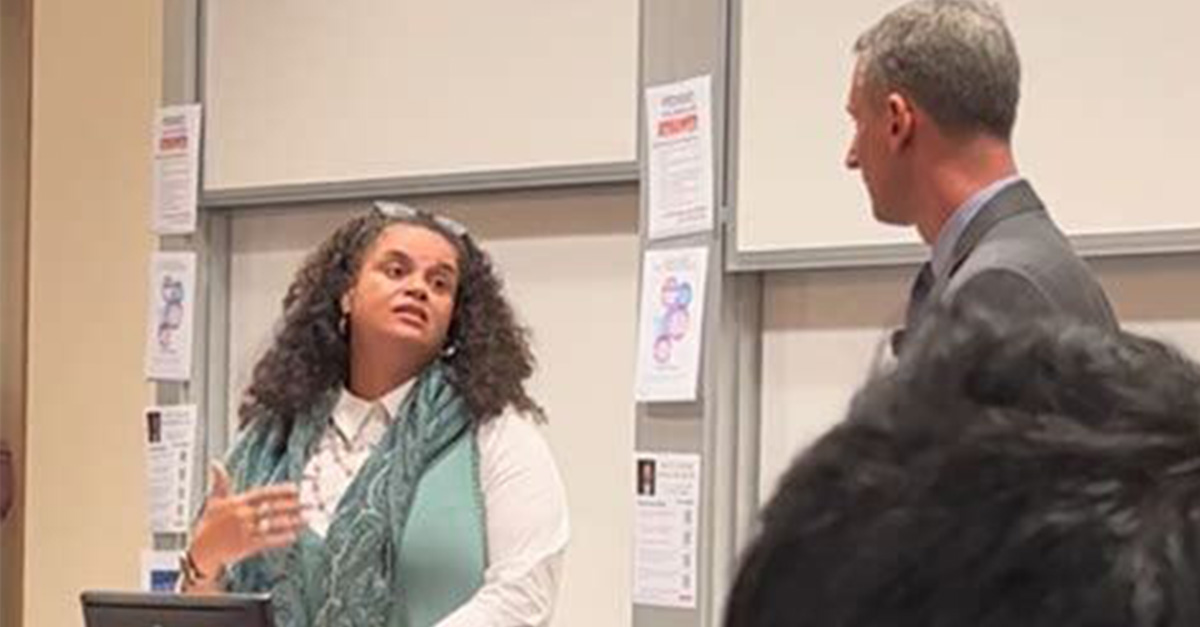


Get a free copy of Parental Rights & Education when you subscribe to our newsletter!

“If enough of these kids get into the legal profession, the rule of law will descend into barbarism.”
–JUDGE KYLE DUNCAN
Stanford Law School says it’s fully dedicated to free speech and the free exchange of ideas — except when it’s not.
The school’s weak-kneed integrity on this issue was fully revealed this past week after a mob of angry, woke law students prevented Fifth Circuit Appellate Judge Kyle Duncan from speaking at a conservative student-led campus event. But then, after the high-ranking Stanford officials apologized to the judge, the mob turned its ire on them, using protest and intimidation to try to get Jenny Martinez, dean of the law school, to retract her apology.
A week later, not a single student or administrator has been punished or even gently chided.
Duncan, a Trump appointee known for his strong views on religious liberty, had been invited to speak on campus by the Stanford Federalist Society on March 9. However, he never got to deliver his talk, titled “The Fifth Circuit in Conversation with the Supreme Court: Covid, Guns, and Twitter.” Before he’d even said a word, the large collection of protestors and hecklers shouted him down.
It got worse when Duncan asked for an administrator’s assistance. Generally, one would assume that a mature, rational school authority would reprimand and hush the crowd for not allowing Duncan to speak unimpeded. Someone did come forward, but not to lecture the disruptors. Instead, she lectured Duncan.
Tirien Steinbach, dean of Diversity, Equity, and Inclusion (DEI), went to the front of the class and asked the students if she could speak. Steinbach then proceeded to give a six-minute diatribe with previously written remarks. Steinbach said, “I’m uncomfortable cause this event is tearing at the fabric of this community that I care about and am here to support. And I don’t know and I have to ask myself and I’m not a cynic to ask this: Is the juice worth the squeeze? Is this worth it?”
Steinbach claimed that Duncan’s opinions from the bench “land as absolute disenfranchisement of” students’ rights, but as Duncan tried to respond, students erupted, demanding that he let her finish, even as she also asked that he let her finish.
She continued by saying that the judge’s work has caused “harm.”
The dean of DEI then offered an endorsement of free speech and welcomed him to the campus before saying that the way to deal with speech that feels “abhorrent, that feels harmful, that literally denies the humanity of people, that one way to do that is with more speech and not less. And not to shut you down or censor you or censor the student group that invited you here. That is hard. That is uncomfortable. And that is a policy and a principle that I think is worthy of defending, even in this time. Even in this time. And again, I still ask: Is the juice worth the squeeze?”
Duncan asked, “What does that mean?” to which students again began shouting at him.
Steinbach replied, “I mean is it worth the pain that this causes and the division that this causes? Do you have something so incredibly important to say about Twitter and guns and COVID that that is worth this impact on the division of these people who have sat next to each other for years, who are going through what is the battle of law school together, so that they can go out into the world and be advocates. And this is the division it’s caused.”
She then went on to say that she understands why “people feel like the harm is so great that we might need to reconsider those policies.” Steinbach added, “And I hope if you learn anything that you can listen through, if you can listen through your partisan lens, your hyper-political lens and just look and see human beings who are asking you to take care, and like all guests on our campus, we ask that you come with good intentions and respect.”
After encouraging the students to choose whether they wanted to stay and listen or not, she continued, “I look out and I don’t ask, ‘What is going on here?’ I look out and I say, ‘I’m glad this is going on here.’”
Judge Duncan never was able to deliver his talk and went directly to questions where remaining protesters lobbed questions at him, either showing ignorance of his judicial record or that were crude. The judge had to be escorted out by federal marshals.
The lead up to the protest shows that it was planned. Before the event, 70 students emailed the Stanford Federalist Society asking them to cancel the event or make it virtual, alleging that Duncan “proudly threatened healthcare and basic rights for marginalized communities.” Steinbach then sent an email to students using the same phrase. Although the dean reminded them of the school’s policies requiring protestors to allow a speaker to be heard, she also said the speech would be a “significant hit” to students’ sense of belonging.
After the Federalist Society refused to cancel, protestors began posting fliers around campus with the names and pictures of its members, saying, “you should be ashamed,” in addition to posting fliers making false claims about Duncan.
Two days later, Marc Tessier-Lavigne, president of Stanford Law School, and Jenny Martinez, dean of the law school, issued an apology letter to Duncan, which stated,
“…what happened was inconsistent with our policies on free speech, and we are very sorry about the experience you had while visiting our campus.”
They also wrote that “staff members who should have enforced university policies failed to do so, and instead intervened in inappropriate ways that are not aligned with the university’s commitment to free speech.”
The president and dean said they are taking steps to make sure it doesn’t happen again but, to date, no student has been disciplined and Dean Steinbach remains in her position.
Duncan said he accepted their apology and hoped that one would also be issued to the members of the Federalist Society. He added, “Given the disturbing nature of what happened, clearly concrete and comprehensive steps are necessary. I look forward to learning what measures Stanford plans to take to restore a culture of intellectual freedom.”
However, proving that the law school has created a monster it can no longer control, the mob soon turned its ire on Martinez for having the nerve to apologize for their bad behavior.
When the dean arrived at her classroom to teach, she found her whiteboard covered in fliers claiming that the students had a right to shout Duncan down and further attacking the judge. About 50 of 60 students in the class participated, wearing all-black and masks that read, “counter speech is free speech.” As Martinez left, the protestors stared at her while lining the hallways from the classroom to the exit were hundreds of other students — an estimated one-third of the entire law school — wearing the protesters’ uniform of black garb and masks.
Any student who didn’t participate by wearing all-black was also stared down in what the non-participating students say was an effort to intimidate them.
To say that this event is unsettling is an understatement. Law school students pay an exorbitant amount of money to learn the Constitution and how to correctly apply the law, not to get in touch with their inner activist and demand that everyone else change to make them feel safe and in charge.
The right to protest is something that must be upheld, whether you agree with the protest or not; however, the right to protest does not mean the right to stop other people from exercising their freedom of speech. Free speech is not preventing others from speaking, free speech is allowing people, regardless of their views, to have the same ability to share their ideas that we all have.
At issue is not the definition of free speech, but the ideological grip on our nation. The students in this protest have been taught from the time they were young that conservatives are evil and dissent is violence.
The left’s domination of public K-12 schools and the media is only surpassed by its mastery of higher education. University faculty and staff are now almost exclusively ideologically left, and they have created environments that breed more and more radically devoted leftists. They maintain their hold by further villainizing those on the right and then stopping any dissent.
This is the opposite of the wisdom found in Proverbs 12:1, which tells us that “Whoso loveth instruction loveth knowledge,” before going on to warn that “he that hateth reproof is brutish.” This truism is also reflected in Proverbs 10:9, which says that “The wise in heart will receive commandments, but a prating fool shall fall.”
Stanford has taught these students to think emotionally, rather than logically, to learn according to ideological propaganda rather than through deep study and debate, and as such, they have produced a student body that is full of anger and indignation, who cannot cope with words or ideas or opinions that challenge their myopic worldview.
What is happening at Stanford isn’t new. It’s the latest example of what has been going on for years. In 2022, Yale law students shouted down Alliance Defending Freedom counsel Kristen Waggoner and a progressive attorney who had come to campus to speak to students. That event, also put on by the Federalist Society, was, ironically enough, devoted to showing how those with different beliefs could agree on the right to free speech and have a civil discussion.
And it continues. A week after the Stanford debacle, the chancellor of the University of California-Davis, Gary May, along with the Sacramento Bee, spread falsehoods concerning statements supposedly made by Charlie Kirk, the CEO of Turning Point USA, who was scheduled to speak on campus. A mob of UC-Davis students, along with Antifa, showed up and attacked the event in an attempt to stop Kirk from speaking.
America’s students are its future, and law students will one day be attorneys, judges, and political leaders. If this is to be the future of our country, then the vision of a free society will die. As Duncan said,
“If enough of these kids get into the legal profession, the rule of law will descend into barbarism.”
Changing the course that the left has set for this country will require parents to be fully involved in their child’s education. It will require refuting the lies of the media and academia. To stop the destruction of the free exchange of ideas, even ideas others’ don’t like, universities must begin hiring those with different political beliefs and defending speakers of differing beliefs. Part of that is making it clear that silencing others is not acceptable.
Stanford University, if it truly is sorry about what happened to Judge Duncan, needs to recommit to basic constitutional principles and the free exchange of ideas. And it must take some form of disciplinary action against the intolerant students and Dean Steinbach for colluding to shut down the free speech of a high-ranking member of the judiciary.
The fight ahead will be tough and it will be protracted, but Christians and conservatives can’t stop fighting for the right to speak — or one day no one will have it.
Ready to dive deeper into the intersection of faith and policy? Head over to our Theology of Politics series page where we’ve published several long-form pieces that will help Christians navigate where their faith should direct them on political issues.
